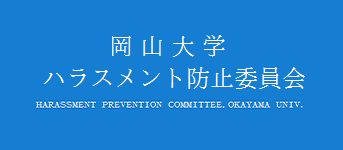Harassment Counseling Procedures
1. Consult a counselor. (pre-consultations)
- Preliminary counseling will be given by a harassment counselor of your department or an expert counselor of the Harassment Prevention Office.
- Preliminary counseling is given in an environment where no other person can see you or hear the content of your counseling session.
- We will ask you about facts.
- Relations between the counselee and the offending party (the person alleged in counseling as the harasser)
- When, where, and how the offending party’s language or behavior took place
- If you consulted some other person and, if so, what were you told by that person
- Current situation of the counselee
- The counselor will give advice to the counselee based on the facts told to him or her by the counselee.
- The content of the counseling session will be kept confidential except to the counselor and the Harassment Prevention Office in charge of that particular counseling session.
2. Official consultations
- Based on the preliminary counseling, formal counseling will be given if the counselee wishes the Harassment Prevention Office to take action.
- Official consultations will be given by the Harassment Prevention Office.
- As a rule, the interview or interviews will be held in the presence of at least two counselors. We will make our best effort to ensure that at least one of the counselors is of the same sex as the counselee.
- We will ask you what kind of action you would like the Harassment Prevention Office to take.
◇If you seek Consultation notification or Reconciliation procedures◇
An expert counselor of the Harassment Prevention Office will prepare a formal complaint reception form. In the process of preparing said form, we will ask you in detail about the facts deemed to constitute harassment.
◇If you seek Mediation procedures or Harassment recognition procedures◇
You will be asked to prepare and submit a request form for remedial measures. The request form for remedial measures will be prepared based on the interview or interviews with an expert counselor of the Harassment Prevention Office.
3. Problem resolution process
The Harassment Prevention Committee can respond in the following ways to consultation matters. Procedures (3) and (4) require deliberations by the Harassment Prevention Committee before they can be taken. None of these procedures involve the consulter interacting directly with the alleged person. In addition, strict confidentiality is imposed on everyone involved in the process regarding the details of the consultations.
(1) Consultation notification
This procedure notifies the alleged person that a harassment consultation has taken place in order to prompt the alleged person to acquire self-awareness on his/her part.This can be done by maintaining the anonymity of the consulter.
(2) Reconciliation procedures
The Harassment Committee requests the Chief of University Component that the alleged person is affiliated with to reconcile between the consulter and the alleged person. The Chief of University Component interviews both of them to resolve the problem within the department.
(3) Mediation procedures
The aim of this procedure is to reach a mediation agreement by choosing a mediator and having him/her mediate between the consulter and the alleged person.
(4) Harassment recognition procedures
The Harassment Committee follows a procedure for confirming the facts that the consulter had provided, and deliberating over recognition of the incident as harassment and the details of any improvement measures to be taken. If an investigation of the facts is needed, the Investigation Committee will conduct the investigation.
Urgent measures procedures
In cases where there is a need to act quickly to prevent the damage from getting worse during harassment consultations, requests to take urgent measures are made via this procedure from Chairperson of the Harassment Prevention Committee to the Chief of University Component which the alleged person belongs to. Interim measures are then taken in cases where the four responses listed above cannot be taken in time.
4. If remedial measures are found necessary
In the harassment recognition process, if remedial measures are found necessary, the Chairperson of the Harassment Prevention Committee will report the results of the harassment recognition process and recommend remedial measures to the President of the University. Based on the recommendation, the President will request the head of the department, etc. to take remedial measures. The head of the department, etc. will then take remedial measures.
※Note
The consulter is not allowed to communicate the content of a harassment counseling session to any third party without a justifiable reason.
It is also prohibited to infringe on the privacy of the parties involved in the case or speak or act in a way that damages the reputations of such parties.
Situations that constitute a “justifiable reason” include consultations, etc. necessary for protecting the counselee’s rights. It is also possible to communicate the content of a harassment counseling session during consultation with such experts as lawyers, doctors, and counselors, or consultation with, reporting to, etc. such public agencies as police and labor departments, or consultation with labor unions, etc.


